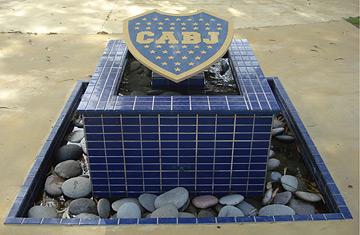
The Boca Juniors soccer team has set aside 3000 plots in a cemetery in Buenos Aires.
"Even death can't separate us, from heaven I will cheer you on," chant the tens of thousands of fans of passionate soccer fans that turn out every week to cheer on Argentina's biggest club, Boca Juniors. Now, the franchise is moving to satisfy this desire to express post-mortem loyalty by opening a cemetery where it promises its most devoted fans burial in the same precinct as its legendary players. Says the club's 1960s ace midfielder Antonio Rattin of the special section of the tranquil, grassy Parque Iraola cemetery outside Buenos Aires opened exclusively for Boca fans, "It's so nice it makes you feel like staying."
A small fountain crowned with a shield in the blue-and-yellow colors of the club guards the access to the sector where 3,000 plots have been set aside for die-hard Boca fans in a hectare of land lined with blue and yellow flowers. And on blue-and-yellow memorial walls, small stars are inscribed with the names of fans and football players who have found their final resting place here.
"The idea was born because so many fans left instructions before they died to have their ashes scattered on the playing field of La Bombonera (the "candy box," as the Boca football stadium in the city of Buenos Aires is known)," says Boca press officer Laura Acosta. Inspiration also came from a widespread custom of club fans of adorning the gravesites of relatives in other cemeteries with Boca-inspired decorations.
"Boca fans are very passionate," says the franchise's marketing manager, Orlando Salvestrini. "It is an eternal love. Now tomorrow we can all together cheer our club from heaven."
Fans who buy plots at prices ranging from $1,000 to $4,000 have been promised that grass from La Bombonera's playing field will be replanted at the cemetery. "At least once in their lifetime, Boca fans have to visit the Boca stadium," said Father Jose Luis Monzon when he blessed the Boca cemetery at the opening ceremony last year. "Now they have a place here, and have of course, another in heaven."
Two Boca legends of the past have already been reburied in the new cemetery, goalkeeper Juan Estrada, who played for the club during the 1930s, and Julio Elias Musimessi, a 1950s ace.
"Soccer is the only great surviving passion in this country," says sports journalist David Carlin. "Tango music has a strong following, but it lacks the sense of rivalry that competing clubs bring to soccer. [The political ideologies of] Peronism and anti-Peronism also once provided a similar sense of belonging and loyalty to a mass group, but that kind of political fervor has subsided in recent years."
Political figures such as the Perons have been superseded as icons of Argentine identity by more recent figures such as former Boca ace Diego Maradona, widely considered during the 1980s to have been the greatest player in the world. In 1986, he led Argentina to World Cup triumph in a campaign whose victims included England, in a symbolic avenging of the humiliating military defeat the country had suffered at British hands in the Falklands four years earlier. Not unlike the Perons, of course, Maradona the icon had his flaws — he was banned from Italian football (where he had played for Napoli) in 1991 for cocaine use, and tested positive for drugs in the 1994 World Cup finals.
Maradona last played professional soccer in 1997, when his fifth comeback for Boca Juniors was abruptly ended after a positive test for cocaine after the first match of the season. Despite these falls, and a slow slide into decadence during a retirement marked by continued reports of substance abuse, sex scandals and violent confrontations with the paparazzi, Maradona is revered here here as "Saint Maradona," or simply "El Diego." A "Maradonian Church" has been created with followers who gather to celebrate his birthday every year with a "Maradona Mass" that includes dancing girls in front of a "Maradonian" altar.
Not surprising, then, that a corner the cemetery has been set aside for Maradona. Boca's most famous player has been awarded a plot free of the charge from the club, although he has made no public comment regarding the gift yet.
"Loyalty to the club you chose in childhood is expected to last a lifetime," says Carlin. "You are expected to die still supporting that club. A man can change wife, or a woman her husband, they can change occupation, but if they are people of honor, it is unthinkable they will ever change soccer club." And in the case of the most devoted Boca fans and their beloved team, not even death need break the bond.
